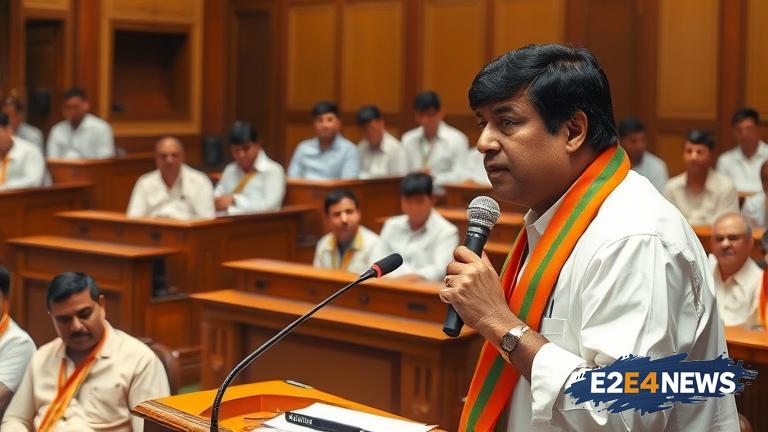In a surprising turn of events, Karnataka Deputy Chief Minister D K Shivakumar has apologized for singing the RSS anthem in the state assembly. The incident occurred during a session of the assembly, where Shivakumar was caught on camera singing the anthem. The video quickly went viral on social media, sparking controversy and debate among politicians and citizens. The RSS, or Rashtriya Swayamsevak Sangh, is a right-wing Hindu nationalist organization that has been accused of promoting divisive and intolerant ideologies. Many have criticized Shivakumar for singing the anthem, citing his position as a leader in the state government and his responsibility to uphold secular values. Others have defended him, arguing that he was simply expressing his personal beliefs and that the anthem is a symbol of national pride. The incident has highlighted the ongoing debate over the role of the RSS in Indian politics and society. The organization has been accused of promoting a Hindu nationalist agenda that is exclusionary and discriminatory towards minority communities. Despite these criticisms, the RSS remains a powerful and influential force in Indian politics, with many prominent politicians and leaders having ties to the organization. Shivakumar’s apology has been seen as an attempt to diffuse the controversy and avoid further criticism. However, many have questioned the sincerity of his apology, arguing that it is too little, too late. The incident has also sparked a wider debate over the role of politicians in promoting or criticizing the RSS. Some have argued that politicians have a responsibility to speak out against the organization’s divisive ideologies, while others have argued that they should remain neutral and avoid taking a stance. The controversy has also highlighted the challenges of navigating complex and sensitive issues in Indian politics. With the country’s diverse population and complex history, politicians must often balance competing interests and ideologies. The incident has sparked a lively debate on social media, with many citizens weighing in on the issue. Some have expressed outrage and disappointment at Shivakumar’s actions, while others have defended him and argued that he has the right to express his personal beliefs. The controversy has also sparked a wider discussion over the role of social media in shaping public discourse and opinion. With the ability to quickly share and disseminate information, social media has become a powerful tool for shaping public opinion and influencing political debate. However, it also raises concerns over the spread of misinformation and the amplification of divisive ideologies. As the controversy continues to unfold, it remains to be seen how Shivakumar’s apology will be received and what impact it will have on his political career. The incident has also sparked a wider debate over the future of Indian politics and the role of the RSS in shaping the country’s trajectory. With the organization’s influence and reach continuing to grow, it is likely that the controversy will continue to simmer and spark debate in the coming days and weeks. The Karnataka state government has faced criticism for its handling of the incident, with some arguing that it has not done enough to address the controversy. The opposition has seized on the issue, using it to attack the government and criticize its leadership. The incident has also sparked a wider discussion over the role of opposition parties in Indian politics. With the ability to hold the government accountable and provide a check on its power, opposition parties play a crucial role in shaping the country’s political landscape. However, they also face challenges in navigating complex and sensitive issues, and must often balance competing interests and ideologies. As the controversy continues to unfold, it remains to be seen how the opposition will respond and what impact it will have on the government’s popularity and credibility. The incident has also highlighted the importance of leadership and accountability in Indian politics. With the country facing numerous challenges and complexities, leaders must be able to navigate difficult issues and make tough decisions. The controversy has sparked a wider debate over the qualities and characteristics that are necessary for effective leadership in Indian politics. Some have argued that leaders must be able to balance competing interests and ideologies, while others have argued that they must be able to take a strong stance and make tough decisions. The incident has also sparked a wider discussion over the role of citizens in shaping Indian politics. With the ability to participate in public discourse and hold leaders accountable, citizens play a crucial role in shaping the country’s trajectory. However, they also face challenges in navigating complex and sensitive issues, and must often balance competing interests and ideologies. As the controversy continues to unfold, it remains to be seen how citizens will respond and what impact it will have on the country’s political landscape.
